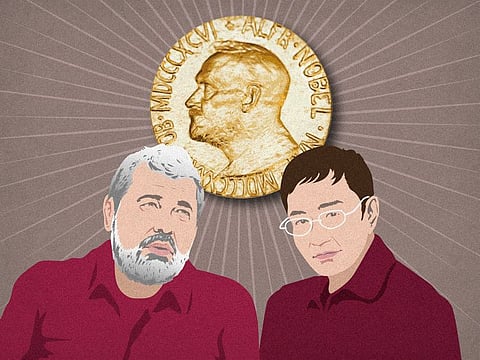Nobel Peace Prize 2021 — safe but significant choices
Nobel Committee’s decision to award Peace Prize to independent journalists is praiseworthy

After ending long-running speculation about this year’s Nobel Peace Prize going to climate activist Greta Thunberg or for her compassionate leadership to Jacinda Ardern, the Norwegian Nobel Committee declared two journalists as the surprising winners.
Maria Ressa from the Philippines and Dimitry Muratov of Russia have been given the Prize as the jury have described them as “representatives of all journalists who stand up for this ideal in the world in which democracy and freedom of the press face increasingly adverse conditions.”
Ressa, after with CNN for nearly two decades, has cofounded a news site Rappler since 2012. She is a well-known critic of the Philippines’ right-wing populists. Ressa has been arrested twice and sentenced to be in prison for six years, and there are at least half a dozen serious cases against her in the court, which can potentially send her to jail for more than a hundred years.
Muratrov, on the other hand, has cofounded the Russian newspaper Novaja Gazeta in 1993 with Mikhail Gorbachev, and since 1995, he has become the editor. The newspaper is well-known for its consistently critical and independent reporting in Russia. Muratrov’s newspaper has been subjected to many attacks, and six of its journalists have already lost their lives.
The world is presently passing through several critical crises. Besides climate change and pandemics, the spectre of populism has posed serious survival challenges for mankind. Right-wing populists are targeting minorities and immigrants in their countries, engaging in the mindless arms race, waging wars against others, and endangering global peace.
With the rise of populism, the democracies in the world have been in decline for more than 16 years. Under the right-wing populists, the freedom of the press is struggling to survive. The 2021 World Press Freedom Index by media watchdog Reporters without Borders (RSF) tells that press freedom is totally or seriously impeded in 73 countries and constrained in 59 others.
The unrelenting assault of populists against journalism has brought a dramatic deterioration in people’s access to information. With that, the ability to make the correct decision and make the right choices.
Freedom of expression
When journalism dies in a country, democracy dies with it. Freedom of expression is a necessary precondition for democracy and lasting peace. Thus, the Nobel Committee has taken a righteous decision by awarding the prestigious Nobel Peace Prize to two brave and inspiring media personalities.
While awarding the Prize to Ressa and Muratov, the Nobel Committee sees them as representatives of all journalists worldwide fighting for democracy and freedom of the press.
This year’s selection can provide encouragement and moral support to journalists committed to their profession in many other countries, where the media has come under relentless assault from populist authoritarian regimes. Making this skilful decision, the Nobel Committee has also, to some extent, tried to retrieve its global standing as its past decisions are being increasingly censured.
Nobel Prize is certainly the most significant honour available in its fields. However, many decisions have generally drawn serious criticism for being Europe-North America-centric and partial to men. 84% of all Nobel Prizes since 1901 have gone to primarily men from Europe and North America.
Less women representation
More than 900 prizes have been awarded in total, but women recipients are nearly 5%. The statistics are even more appalling when it comes to race, as only 1.5% Blacks have got it.
The selection of peace laureates has often been controversial. The omission of Gandhi from the list still haunts the Nobel Committee. On the other hand, peace prizes to the likes of Ku Klux Klan supporter Woodrow Wilson, Henry Kissinger, apartheid-advocate F.W. de Klerk continue to draw criticism.
In recent years, the focus of the critics has been primarily on Aung San Suu Kyi of Myanmar for her alleged role in the oppression of Rohingya. Even Barack Obama being awarded the Prize a few months after being elected as the US President still baffles almost everyone about the rationale behind it.
In this context, the Norwegian Nobel Committee’s decision to award the Peace Prize to two brave and independent journalists waging a relentless struggle for press freedom is safe but a highly significant one.
The selection belies the allegations of gender and regional priorities and is based on what recipients have already achieved, not what they hoped to do. Moreover, the honour to Maria Ressa and Dimitry Muratov will hopefully help to give more power to those journalists who are at the forefront of the battle against the right-wing populists.









